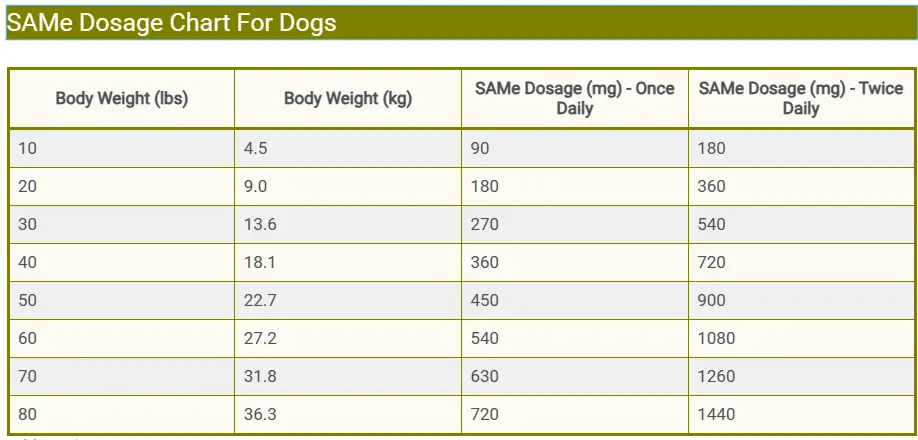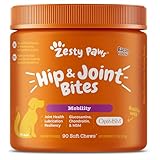The dosage of SAMe for the treatment of liver disease in dogs is typically 18 mg per kilogram of body weight (or 9 mg per pound), administered once daily or may be divided into 2 doses. However, the exact dosage may vary depending on the severity of the illness and the veterinarian’s prescription.
SAMe Dosage For Dogs

-
Ideal Dose: 18 mg/kg ( 9 mg/lb)
-
Uses: Liver and Joints Support
-
FDA Approved: No
-
Variants: Tablets & Powder
-
Storage & Handling: Room Temperature
-
Administration: Once or Twice Daily
Disclaimer: Self-medication can be hazardous. Please consult your veterinarian for personalized guidance on the appropriate dosage for your furry friend’s specific condition.
When it comes to the health and well-being of our furry companions, pet owners spare no effort to ensure they receive the best care possible.
S-adenosylmethionine, commonly known as SAMe, has emerged as a popular supplement in veterinary medicine, particularly for its potential benefits in managing liver health conditions in canines.
However, determining the correct dosage of SAMe for dogs can be daunting for pet owners.
In this comprehensive guide, we delve into the intricacies of SAMe dosage for dogs, shedding light on its uses, recommended dosages, and crucial considerations for ensuring the optimal health of our canine companions.
SAMe Dosage For Dogs
The appropriate dosage of SAMe (S-Adenosyl-L-Methionine) for dogs can vary depending on size, weight, and health condition.
Typically, SAMe is available in tablet or powder form for dogs. The dosage recommended by veterinarians commonly ranges from 10 to 18 milligrams per kilogram of body weight, given once or twice daily. However, this can vary, so it’s crucial to follow the dosage instructions provided by your vet or the product packaging.
It’s essential to stay within the recommended dosage unless advised by your veterinarian, as overdosing can lead to adverse effects.
Constantly monitor your dog for discomfort or adverse reactions while taking SAMe.
Remember, while SAMe can benefit certain conditions in canines, it’s crucial to use it under veterinary guidance to ensure safety and effectiveness.
SAMe Dosage Chart For Dogs
| Body Weight (lbs) | Body Weight (kg) | SAMe Dosage (mg) – Once Daily | SAMe Dosage (mg) – Twice Daily |
|---|---|---|---|
| 10 | 4.5 | 90 | 180 |
| 20 | 9.0 | 180 | 360 |
| 30 | 13.6 | 270 | 540 |
| 40 | 18.1 | 360 | 720 |
| 50 | 22.7 | 450 | 900 |
| 60 | 27.2 | 540 | 1080 |
| 70 | 31.8 | 630 | 1260 |
| 80 | 36.3 | 720 | 1440 |
Related Post: Sulfamethoxazole Tmp Dosage For Dogs
Uses
One of the primary uses of SAMe in dogs is for liver support. SAMe is involved in synthesising glutathione, a potent antioxidant that helps protect liver cells from damage. Veterinarians may recommend supporting liver function in dogs with liver disease, hepatitis or those undergoing treatment for liver conditions.
SAMe has also shown promise in supporting joint health and mobility in dogs. It is believed to help maintain cartilage health and reduce inflammation in the joints, making it beneficial for dogs with conditions such as osteoarthritis or hip dysplasia.
Related Post: Terbinafine Dosage For Dogs
Potential Side Effects
-
Gastrointestinal Upset
-
Agitation or Anxiety
-
Allergic Reactions
-
Interactions with Medications
-
Liver Dysfunction
Which Dogs Should Not Take SAMe (S-adenosylmethionine)
Canines with the following health issues should not take SAMe (S-adenosylmethionine) without veterinary recommendations.
-
Dogs with known allergies to SAMe or its ingredients should avoid its use.
-
Dogs with severe liver dysfunction or bleeding disorders should only use SAMe under close veterinary supervision.
-
Dogs taking medications that may interact with SAMe, such as antidepressants or drugs metabolized by the liver, should consult a veterinarian before starting supplementation.
-
The safety of SAMe supplementation in pregnant or nursing dogs is not well-studied, so it’s generally best to avoid it unless advised by a veterinarian.
-
SAMe supplementation is not typically recommended for very young puppies.
-
Some dogs may be sensitive to SAMe supplementation, experiencing adverse effects such as gastrointestinal upset or increased anxiety.










![Can Dogs Eat Blood? 7 Side Effects [Expert Opinion]](https://petskor.com/wp-content/uploads/2022/04/Webp.net-resizeimage-12.jpg)
